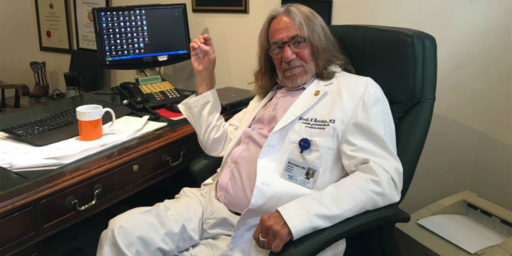Doctor’s Office Baby Pictures Barred By HIPAA
A good law has one rather silly unintended consequence.
Obstetricians officers are apparently ending the decades old practice of posting pictures of babies delivered by their physicians because of federal health care privacy laws:
Pictures of smiling babies crowd a bulletin board in a doctor’s office in Midtown Manhattan, in a collage familiar to anyone who has given birth. But the women coming in to have babies of their own cannot see them. They have been moved to a private part of the office, replaced in the corridors with abstract art.
“I’ve had patients ask me, ‘Where’s your baby board?’ ” said Dr. Mark V. Sauer, the director of the office, which is affiliated with Columbia University Medical Center. “We just tell them the truth, which is that we no longer post them because of concerns over privacy.”
For generations, obstetricians and midwives across America have proudly posted photographs of the babies they have delivered on their office walls. But this pre-digital form of social media is gradually going the way of cigars in the waiting room, because of the federal patient privacy law known as Hipaa.
Under the law, the Health Insurance Portability and Accountability Act, baby photos are a type of protected health information, no less than a medical chart, birth date or Social Security number, according to the Department of Health and Human Services. Even if a parent sends in the photo, it is considered private unless the parent also sends written authorization for its posting, which almost no one does.
So doctors — especially those at large institutions with internal compliance officers — have been stripping down the walls or, as Dr. Sauer did at the Center for Women’s Reproductive Care, hiding the photos, often with a bit of sadness. (The babies on the office’s website are models.)
While privacy is a virtue, the doctors say, the law could make more sensitive distinctions.
“For me, the face of a baby, that is really an anonymous face,” said Dr. Pasquale Patrizio, director of the Yale Fertility Center in New Haven. “It was representative of so much happiness, so much comfort, so much reassurance. It is purely a clinical office now.”
Although his center no longer displays the photos, parents insist on sending them in, Dr. Patrizio said. “We are scanning them and leaving them in their own charts — their encrypted charts,” he said, chuckling.
Most people know Hipaa as the law responsible for the “Notice of Privacy Practices,” the blizzard of forms given to patients to sign, informing them of the ways in which their protected health information may be used. The law was enacted in 1996, but the banishment of baby photos has accelerated since 2009, when an economic stimulus bill provided money to promote electronic health records and let the government step up enforcement of the rules.
Rachel Seeger, a spokeswoman for the Office for Civil Rights of the Department of Health and Human Services, confirmed that the displays were illegal. “A patient’s photograph that identifies him/her cannot be posted in public areas” unless there is “specific authorization from the patient or personal representative,” she wrote in an email.
I’m not sure when this practice of doctor’s having that large wall of baby photos became common. Perhaps it existed when I was a child, but then I can’t say that I have any memory of visiting the office of the doctor that delivered me, and I don’t recall anything like that at the Pediatricians office I was taken to as a child. One assumes that it became common around the same time that home photography because easy and cheap, though The motivation behind it is easy to understand, of course. New parents want to share the joy of the birth of their child, and the doctor’s office that was so involved in the process seems like a natural place that you’d share such things with. By the same token, of course, it’s easy to see the motivations behind the privacy provisions in HIPAA as well. Keeping patient information secure is essential to the integrity of the doctor-patient relationship and in the modern era where much of this information is stored electronically and shared with third parties such as insurance companies, a law like HIPAA was obviously needed in order to formalize confidentiality rules that had, in many cases, been largely informal for a very long time. That being said, I’m not sure that anyone who drafted or voted for the law thought that it would cover something as innocuous as a collage of baby photographs in a doctor’s office, even though by the strict terms of the law it clearly is banned.
The obvious solution around something like this would be a simple written waiver from the parents to allow the picture to be displayed, but raises the prospect of more paperwork and such. In the end, this strikes me as a rather silly unintended consequence from a well-intentioned law.







Of course, when the mom is coming in for the delivery, they have to fill out a HIPAA form; obstetricians could add a checkbox to the standard form allowing the release of the baby photo for the sole purpose of being on the baby wall, and they’d have a populated wall again in no time flat.
@Chris Lawrence:
Yea, I’m not a HIPAA lawyer, but that would seem to cover it.
Surely this could be handled by a simple waiver?
If there is a federal official who first raised this an enforcement issue, then put his/her picture and a picture of his/her immediate supervisor on a Wall of Idiots. Post Wall on 100,000 webpages, facebook and twitted entries until universal recognition is achieved.
Law enforcement requires discretion and judment. People without those qualities need to get out of government. The fact that people have so little faith in the common sense of the federal government that a wall of baby pictures might be deemed a breach of HIPAA says a lot.
This is basically the result of the American people freaking out over … everything, people worry that virtually everything can be the basis of an expensive lawsuit. The doctor understandably pulled the pictures down rather have to deal with this non-issue at all.
@George Tobin:
Which do you think is likelier–a “federal official” made this an issue, or a misunderstanding occurred between a doctor and a temperamental parent resulting in pictures being taken down, and now other doctors are following suit?
What is even more likelier–a disgruntled parent raising a complaint, or simply doctor’s offices and hospitals complying with a law? Indeed, from the article:
For an underfunded government bureaucracy that hasn’t been able to function efficiently in about 6 decades, people sure are scared of made-up federal boogeymen.
I can recall signing waivers to allow our babies’ pictures to be posted on-line with first name. We were verbally told what their policies were. Since the law hasn’t changed in the interim, I suspect that developing a policy and a waiver form isn’t seen as worth the effort by some doctors.
This is not Smart Government.
This is a side issue, to be sure, but it should be comforting for a woman undergoing a difficult pregnancy to see a wall full of photos of healthy, happy infants. The photos might provide her with some assurance that things will go well for her, too.
@Neil Hudelson:
Misunderstandings and over-zealousness rule the day. Even the specter of a situation where a lawsuit (baseless or not) could theoretically happen is enough to motivate some people into “proactive” stupidity. There is such a thing as being over cautious…..
Not an unfair point, CSK.
I understand that this is generally why you will not see photo collages such as this at the offices of fertility doctors, notwithstanding the HIPAA issues
Not always. I have a friend who’s completely psycho about her firstborn (now approaching two). No pictures, period. If she finds him in any picture of yours, it can’t go up on FB, Twitter, etc (or better come down if its up) because she’s terrified someone’s going to come snatch him one day if they see how adorable he is. The irony being, if he does go missing, we have absolutely nothing to provide to the police if we needed to!
I can totally see someone like her challenging the baby board, screaming and invoking HIPAA at some poor nurse who doesn’t get what the problem is and just wanted to add to the collection.
@Neil Hudelson:
Do legislators sometimes pass laws that have unintended consequences? You bet. But just as often parents are the source of the type of regulations that we are mocking here at OTB.
After seeing what my wife went through in her 5 years as a school board trustee, I see parents as the reason why we have these kind of laws. Disgruntled parents are the source of zero-tolerance laws, and those same parents who wanted those rules, regulations or laws usually end up complaining about the heavy handed discipline that results from the regulations that they wanted.
We live in a CYA world, one that we created.
The physician should not be posting patient pictures on the wall without consent, regardless of whether or not a privacy act applies. It is unethical and borders on theft.
There, I said it.
I’m reading that doctor’s office sign-in sheets that others can see are themselves HIPPA violations. That strikes me as a bit too much, but I’m not a HIPPA-compliant plaintiff’s attorney.
@rudderpedals: In every ob/gyn/pediatrician’s office I’ve been to, the pictures on the wall were sent in by parents (my ob staff encouraged me to bring a photo of the baby for the wall). Unless the doctor is taking pictures without the parents’ consent or knowledge (pretty impossible since children and babies are almost never without their parent at the doctor’s office) I can’t see where it would be a problem for anyone. Or is my snark meter way off today?
@rudderpedals:
But it appears that the photos are ones the parents send the doctor, not photos he himself takes. Presumably the pics are sent with the intent they be added to the display.
@beth: @CSK: Yes, these two examples show someone consented. Posting them is unethical but consent takes care of the law.
@Doug Mataconis:
Yes. When we were visiting a clinic, they even asked patients not to bring any children they already had so as not to upset the other patients.
@rudderpedals: While I don’t think it’s unethical, I do find it to be a bit weird. While parents may legally have the right to consent to have their kid’s photos displayed, I’m not sure it’s the right choice although it doesn’t bother me as much as what gets posted on the internet which could possibly be out there in cyberspace forever. I’ve got a family member who posts every little medical thing about her kids on Facebook. Will they be happy twenty years from now when their employers can google them and find out they were diagnosed on the autism spectrum when they were three or had a reading disability in grammar school? I’ve been thinking a lot about whether parents should have the right to post confidential medical info about their kids on the internet.
I often wonder why a lot of these laws are not revisited to make changes. This “Hippa” law has indeed caused some problems. Our doctor’s office would not give me my wife’s cholesterol results over the telephone (gone shopping) unless she signed some sort of permission form. Weird!
These regulations have gotten so ridiculous.
@beth:
Well, most parents think they own their children so they don’t see reason why divulging something like that would be an issue. If you even suggest the child has rights to privacy in medical matters like this independent of the parent, you’re going to get an earful.
@Tyrell:
No offense, but how do they know she wants you to know that? People still have a right to privacy after getting married – not all spouses can or should be trusted with medical matters (look at Casey Kasem’s wife, for god’s sake!). They can’t just assume and frankly, you sign those forms pretty early on in the doctor/patient relationship so this may not be the doctor’s office being difficult.
Consent is not silence nor lack of action. Consent is active permission freely given. If your wife gives it, great! If not, then oh well. Either way, it can wait till the shopping’s done.
@KM: I don’t really mean parents shouldn’t have the right to do it – it’s not like I want a law passed. I just wish it would be socially unacceptable to publicize your child’s private medical info. It makes me feel uncomfortable knowing some of the stuff I’ve seen posted on Facebook and I just wonder what the kids are going to think about it when grown. Even though they are minors, they’re still people and should have the right to their own privacy in matters like this.
@beth: I agree. The acid test should be whether or not the disclosure is medically necessary. It has to be a tough test because the kid has to live with the parent’s decision. Your family member fails his kid and the test.
The provider posting patient photos is not acting ethically because the patient can’t consent and the parent is particularly susceptible to exploitation by a trusted professional taking advantage of the relationship to bag another one.
@rudderpedals:
I think the sticking point here is that people are confusing an extremely common action in everyday life (proudly sharing baby photos, regardless of consent) with the same action being done by an authority figure. For most people, the activity is harmless (beneficial, even) and they don’t differentiate between the two. Still, the doctor is not your friend nor family but a licensed professional acting in a professional capacity. The threshold they are held to is higher and they can’t just thoughtlessly do what Joe Shmoe does hourly. The ethics are actually very clear this; they just run counter towards the average person’s daily experience and so you get the whole “Well that’s stupid!” bit.
@rudderpedals: It’s also because the Internet, like elephants, never forget…..
Maybe if we’re going to have the internet be used as our off-brain repository for material and photos, we should start insisting that links fail and decay the same way our own brains do….
1) The doctor isn’t taking the pictures. They have to be given by the parents.
2) I don’t think parents are as stupid as you think they are. Also, most aren’t as paranoid either. TG.
Steve
On the broader issue of HIPAA , doctors bought this on themselves. My first daughter pre-dates HIPAA. We went to a nurse-midwife birthing center with really high patient confidentiality standards, while everyone else in our parent group used an OB-GYN/Hospital combo. During a group conversation we learned that everyone but us had started getting baby related marketing material by the end of the first week after the test came back positive. The doctors and hospitals were making good business selling the names and addresses of the parents to marketing list vendors. On the other hand, we didn’t get any mailings until my wife sent away for the first free Doctor Seuss book (do they still have those offers?) And then the flood gates opened.
Trivia – HIPAA = Health Insurance Portability (?) Act (I can’t remember what the first A is for) it’s about guaranteeing you can keep your health insurance for a period of time after you lose your job – if you can afford it. The privacy clauses were meant in part to address the issues that might arise from that.